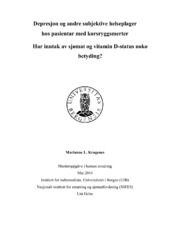| dc.contributor.author | Krogenes, Marianne Leiknes | en_US |
| dc.date.accessioned | 2014-07-16T07:49:11Z | |
| dc.date.available | 2014-07-16T07:49:11Z | |
| dc.date.issued | 2014-05-15 | eng |
| dc.date.submitted | 2014-05-15 | eng |
| dc.identifier.uri | https://hdl.handle.net/1956/8158 | |
| dc.description.abstract | Background: Vitamin D is found in limited selections of food, among other fatty fish and fish liver, as well as fortified food such as margarine and milk. Other vitamin D sources are dietary supplements and sunlight. Low back pain patients have possibly higher prevalence of subjective health complaints, including musculoskeletal pain and depression, than the general population. Seafood consumption and vitamin D status have been proposed to have an impact on these health complaints. The aim of this thesis was to assess whether vitamin D status and seafood consumption can be related to depression and other subjective health complaints in patients with low back pain. Material and Methods: The material in this thesis was a part of the low back pain study Cognitive Interventions and Nutritional Supplements (CINS). The data is collected from baseline and was followed-up after 12 months. A total of 554 participants were included. Seafood consumption, depression and other subjective health complaints were identified from questionnaires. Vitamin D status was determined by measuring plasma levels of 25-hydroxyvitamin D. Seafood consumption and vitamin D status were tested against subjective health complaints and depression by using statistical tests. Results: Depression score higher than cut off was associated with lower vitamin D status (z= -2.614, p=0.009, r=-0.190), but after adjustment for gender, findings were not significant. No correlations were found between seafood consumption and/or vitamin D status and subjective health complaints. Forty-three percent had an average seafood consumption below 300 g/week. The average intake of fatty fish was 30% of the total seafood consumption. The average vitamin D status for the group was 65±24 nmol/l. Participants who used omega-3 supplements had significantly higher vitamin D status (t=-2.317, p=0.022, r=-0.171), but seafood consumption and vitamin D status had no correlation. After 12 months there was no significant difference in seafood consumption, but there were significantly lower scores on depression and other subjective health complaints. Conclusion: Results in this thesis can not confirm the hypothesis that higher consumption of seafood and/or vitamin D status correlate negatively with depression and other subjective health complaints. Intake of fatty fish and seafood in general was lower than Norwegian Recommendations, but the average vitamin D status for the group was sufficient. Use of dietary supplements and sunlight exposure may be more important for adequate vitamin D status than seafood. Further studies are needed to assess possible confounding factors and causality. | en_US |
| dc.description.abstract | Bakgrunn: Vitamin D finnast i matvarer som feit fisk og fiskelever, samt tilsett i matvarer som margarin og mjølk. Andre vitamin D-kjelder er kosttilskot og sollys. Pasientar med korsryggsmerter har høgare førekomst av subjektive helseplager, inkludert muskel- og skjelettsmerter og depresjon, enn normalbefolkninga. Sjømatinntak og vitamin D-status har blitt føreslått å ha samanheng med desse plagene. Målet med oppgåva var å undersøke om vitamin D-status og sjømatinntak har betyding for depresjon og andre subjektive helseplager hos pasientar med korsryggsmerter. Material og metodar: Materialet i oppgåva var ein del av ryggstudien Cognitive Interventions and Nutritional Supplements (CINS). Data er samla frå baseline og følgt opp etter 12 månadar. Totalt blei 554 deltakarar inkludert. Sjømatinntak, depresjon og andre subjektive helseplager blei kartlagt ut i frå spørjeskjema. Vitamin D-status blei bestemt ved å måle plasmanivå av 25-hydroksyvitamin D. Sjømatinntak og vitamin D-status blei testa mot depresjon og andre subjektive helseplager med statistiske testar. Resultat: Deltakarar med score på depresjon over grenseverdi hadde signifikant lågare vitamin D-status (z=-2.614, p=0.009, r=-0.190), men ved kontroll for kjønn var resultatet ikkje signifikant. Det blei ikkje funne samanheng mellom sjømatinntak og/eller vitamin D-status og subjektive helseplager. Førtitre prosent hadde eit gjennomsnittleg sjømatinntak under 300 g/veke. Gjennomsnittleg inntak av feit fisk var 30% av totalt sjømatinntak. Gjennomsnittleg vitamin D-status for gruppa var 65±24 nmol/l. Deltakarane som brukte omega-3-tilskot hadde signifikant høgare vitamin D-status (t=-2.317, p=0.022, r= -0.171), men sjømatinntak og vitamin D-status hadde ingen samanheng. Etter 12 månadar var det ingen signifikant forskjell i sjømatinntaket, men score på depresjon og andre subjektive helseplager var signifikant lågare. Konklusjon: Resultatet i denne oppgåva kan ikkje bekrefte hypotesen om at høgare sjømatinntak og/eller vitamin D-status korrelerar negativt med depresjon og andre subjektive helseplager. Inntaket av feit fisk og sjømat generelt var lågare enn norske anbefalingar, men gjennomsnittleg vitamin D-status for gruppa var tilfredstillande. Bruk av kosttilskot og sollyseksponering kan vere viktigare kjelder for tilstrekkeleg vitamin D-status enn sjømat. Fleire studiar er nødvendig for å avdekke konfunderande faktorar og kausalitet. | en_US |
| dc.format.extent | 2933184 bytes | eng |
| dc.format.mimetype | application/pdf | eng |
| dc.language.iso | nno | eng |
| dc.publisher | The University of Bergen | eng |
| dc.subject | Korsryggsmerter | eng |
| dc.subject | Depresjon | eng |
| dc.subject | Subjektive helseplager | eng |
| dc.subject | Sjømat | eng |
| dc.subject | Vitamin D | eng |
| dc.subject | Ernæring | eng |
| dc.subject.mesh | Low Back Pain | eng |
| dc.subject.mesh | Vitamin D | eng |
| dc.subject.mesh | Seafood | eng |
| dc.subject.mesh | Depression | eng |
| dc.title | Depresjon og andre subjektive helseplager hos pasientar med korsryggsmerter. Har inntak av sjømat og vitamin D-status noko betyding? | en_US |
| dc.type | Master thesis | |
| dc.rights.holder | Copyright the author. All rights reserved | |
| dc.description.degree | Master i Human ernæring | |
| dc.description.localcode | MAMD-NUHUM | |
| dc.description.localcode | NUHUM395 | |
| dc.subject.nus | 759999 | eng |
| fs.subjectcode | NUHUM395 | |
